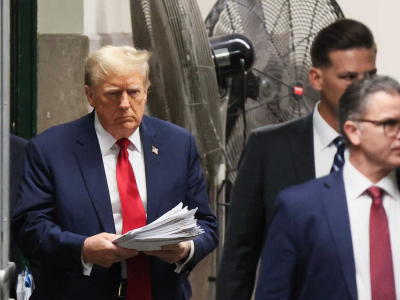
House Speaker Mike Johnson's strategic maneuvering on foreign aid legislation reached a pivotal juncture last Friday, as the Republican-sponsored aid package navigated a critical procedural hurdle in the House. Despite a flurry of GOP defections, Democrats rallied behind the initiative, ensuring its advancement with a 316-94 vote in favor. This bipartisan effort culminated in a poised setup for a Saturday vote on the final passage of aid bills earmarked for Israel, Taiwan, and Ukraine.
Notably, Thursday night witnessed an unusual display of bipartisan cooperation, as Democrats facilitated the progression of the bills out of the rules committee, underscoring the urgency and consensus surrounding the foreign aid agenda. However, dissent within Republican ranks surfaced during the committee proceedings, as Representatives Ralph Norman, Thomas Massie, and Chip Roy opposed the rule, highlighting internal discord over the direction of foreign aid policy.
Earlier in the week, Speaker Johnson encountered resistance from within his own party regarding his proposal to bifurcate foreign aid into distinct bills. Critics cited Johnson's earlier commitments, particularly his pledge not to advance a Ukraine aid bill without concurrent measures addressing border security concerns. Despite internal friction, the momentum behind the foreign aid bills remained steadfast.
Aligned with the Senate's $95 billion package passed in February, the House's foreign aid initiative also includes a fourth bill spearheaded by Speaker Johnson. This additional legislation targets the implementation of sanctions and policies aimed at countering the influence of China, Iran, and Russia, bolstering the comprehensive scope of the aid package.
President Biden's vocal endorsement of the package further underscores its significance and bipartisan appeal. The urgency of addressing foreign aid became pronounced in the wake of Iran's unprecedented attack on Israel over the weekend, reigniting calls for robust support to safeguard Israel's security interests.
The House bill allocates $26.4 billion in aid to Israel, emphasizing defense against Iranian aggression and reimbursing U.S. military operations in response to recent provocations. Noteworthy provisions include $4 billion designated for replenishing missile defense systems such as the Iron Dome and David's Sling, supplemented by $1.2 billion allocated for the Iron Beam defense system. Additionally, $2.4 billion is earmarked for ongoing U.S. military operations in response to emerging threats, underscoring the multifaceted approach to addressing regional security challenges.
My knowledge is up to date as of January 2022. Hamas is designated as a terrorist organization by several countries and international organizations, including the United States, Israel, the European Union, and others.
The ongoing conflict in Ukraine has underscored the urgent need for bolstered defense capabilities, as President Volodymyr Zelenskyy voices concerns over Russia's significant advantage in artillery. Recent months have seen limited gains by Russian forces on the ground, prompting Ukrainian military officials to highlight critical shortages of ammunition, leading to strategic retreats in some instances.
Compounding Ukraine's challenges is the escalating threat posed by Russian airstrikes, which have targeted cities and vital infrastructure, including power plants. Despite the effectiveness of Ukrainian air defense systems, reports indicate a shortfall in air defense missiles required to intercept incoming Russian attacks. While key areas like Kyiv enjoy robust protection, other regions face vulnerabilities due to limited air defense capabilities.
The aid package earmarked for Ukraine reflects a comprehensive approach to address these pressing security needs. With nearly $14 billion allocated for advanced weapons systems and defense equipment, the bill aims to enhance Ukraine's defensive capabilities on multiple fronts. Additionally, $13.4 billion is designated to replenish U.S. defense stockpiles, bolstering support for Ukraine's defense efforts.
In the Indo-Pacific region, the bill allocates over $8 billion to counter the influence of communist China and ensure regional deterrence. Notably, significant funding is directed towards Taiwan, including foreign military financing and support for defense services, underlining U.S. commitment to regional stability.
Furthermore, the package includes provisions aimed at sanctioning Russia, Iran, and China, alongside efforts to access seized Russian assets to offset the costs of additional aid. Additionally, a House bill targeting TikTok's Chinese parent company ByteDance underscores bipartisan concerns regarding national security and data privacy.
Senate Intelligence Committee leaders, Senator Mark Warner and Senator Marco Rubio, have thrown their support behind the House bill, urging Senate consideration. However, concerns raised by Senator Maria Cantwell highlight the complexities surrounding the proposed legislation, underscoring the need for further deliberation and potential declassification of intelligence to inform decision-making.
Concerns mounted among proponents as the Senate's slower pace threatened to derail efforts to enact restrictions on TikTok and ByteDance before the year's end. With TikTok and ByteDance ramping up advertising spending to oppose the proposed ban, particularly in states pivotal to key Senate races, the stakes were high. The companies argued vehemently against any measures compelling a sale, citing concerns over free speech rights for their vast U.S. user base of 170 million and potential repercussions for small businesses and content creators reliant on the platform.
Amidst this backdrop, bipartisan negotiations between House and Senate leaders sought to address Senate concerns regarding the proposed TikTok legislation. One significant adjustment involved extending the period for ByteDance to find a new buyer from six months to a year, a move endorsed by Senator Cantwell, lending crucial support to the bill's prospects.
Expressing satisfaction with the amended legislation, Cantwell emphasized the necessity of allowing ample time for a potential deal to materialize. This endorsement provided a significant boost to the bill's momentum, reinforcing optimism among its proponents.
Representative Raja Krishnamoorthi, co-author of the House TikTok bill, hailed the adjustments as enhancements, expressing confidence in the bill's eventual passage. With bipartisan cooperation and key endorsements, including Cantwell's, prospects for the inclusion of the TikTok legislation within the broader foreign aid package appeared promising.
In conclusion, the bipartisan efforts to address national security concerns surrounding TikTok and ByteDance within the context of the foreign aid package have seen significant progress. Through negotiations and amendments aimed at addressing Senate apprehensions, key endorsements from leaders like Senator Cantwell have bolstered the bill's prospects for passage. With a commitment to safeguarding free speech rights while addressing security imperatives, policymakers remain optimistic about the bill's eventual inclusion and enactment, underscoring the importance of bipartisan cooperation in addressing complex national security challenges.





